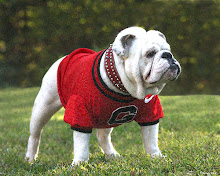Based on the Drive-by Truckers song "Decoration Day"
It's usually the insignificant moments which send me whirling back, lightheaded, giving birth to the fear and anger that most marked my adolescence. It's the smell of honey suckle on the summer breeze, or a glimpse of my father's cold blue eyes and hawk-like nose in my morning mirror.
Those moments take my breath, steal it from me, and leave me momentarily shocked and disoriented until I realize it's over, all the fighting. It's over, removed from the now-quiet existence I lead by three decades of life in this small south Georgia town.
Sometimes, I awake from sleep staring dead in the face of the broken, crying teenage boy we left in the woods that June night, the sound of my brother's voice exhorting me to run faster reverberating around the three bedroom ranch house of my new life. Those moments leave me searching for security, forcing me to touch my wife for some shred of reality, her mere presence pulling me back from the netherworlds of my dream-like state.
It's the quiet nights on the porch where he haunts me, that boy, and my father's voice, too, winging out of the planted pines, carried on the wind, reminding me of my name, my life, and the heritage of pain of he left me.
At one time I took pride in the heritage. We were soldiers, warriors in the grand family tradition. We were Lawsons, true to the name and to the family. We were defenders of the land, keepers of the fight, perpetuating three generations of familial hate with the Hills.
I saved the newspaper accounts of the events, each tucked quietly away inside my mom's Bible, placed high on the shelf in spare bedroom where no one is likely to find them. Each clipping, now somewhat yellowed with age, recounts the struggle of two families locked in a generational grudge match, a battle to regain lost prides by the genocide of the opposing family.
Each article somehow works in "feud," though the word doesn't quite capture the struggle. It was more than a feud. For us it was a war more real than any battle fought in
I don't remember the beginning of the violence any more than I remember the first days of my own life. It was always there, a permanent fixture of my childhood home. My mom said my first word was "fight," my second "Hill." I somehow doubt that, though it wouldn't surprise me.
As a child, I didn't really care why we fought or hated, just as long as we did. It was nice to have something to hate, something to serve as the antithesis of our good and perfect family. The hate was comfortable, a way of life.
I remember my father telling jokes about the Hills, mocking their rusted-out car, mouth replicating the exaggerated engine noise and grinding gears as he rocked back and forth on the porch. The boys would laugh and egg him on, my father always obliging with more vigorous rocking and an even louder grinding of the gears, often accompanied with his mangled mimicry of the Hill's speech pattern.
Mama would smile and tell him to behave himself before returning to the inside of the house. Dad would continue, quieter this time. Even Daddy didn't want to aggravate Mama.
Truth be told, their car was no less rusty or noisy than ours, and their speech patterns certainly weren't much different, each retaining the somewhat cumbersome dialect of the foothills, not quite mountainous but not quite flatlanders either.
Now it's Decoration Day, and as my pastor speaks from the pulpit of honoring the fallen veterans of the community, I wonder how to honor my father. The pastor urges us to take a flag to mark the graves of soldiers in the church's graveyard. My son moves beside me, eager to sprint down the aisle to grab a flag.
My father was a soldier.
In my father's case, a flag seems inappropriate, a touch too patriotic and respectable for the old man. Truth be told, I've a mind to roll a stone on his grave, I chuckle dryly to myself. Perhaps that would keep the old man in his resting place and remove him from the guilt I carry, the blood on my hands only I can see.
I laugh aloud to myself, wondering what he would say if he knew my thoughts. "Son, keeping me down won't keep you away."
I suck in air too quickly, cough, and shiver, suddenly cold from memory of my father's voice. I know I'll never escape it.




